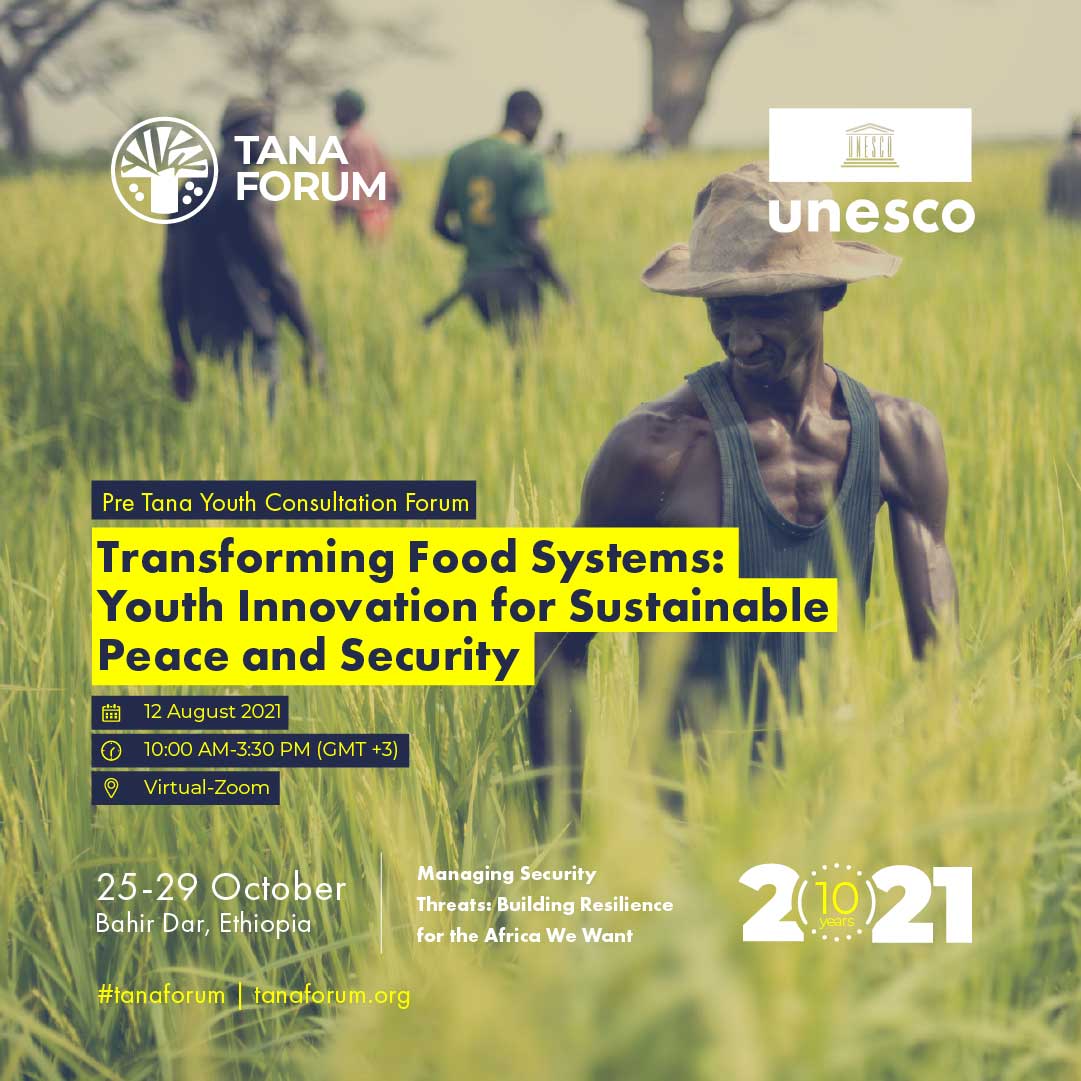Transforming Food Systems: Youth Innovation for Sustainable Peace and Security

The 10th edition of the Tana High-Level Forum on Security in Africa will take place on 25-28 November 2021 in Bahir Dar in hybrid format under the theme, “Managing Security Threats: Building Resilience for the Africa We Want”. In line with this, the Secretariat held a youth consultation forum which provided a platform for young Africans to engage and mobilize on the Tana Forum theme and youth related issues. Youth day was celebrated at international level on 12 of August 2021 under the theme “Transforming Food Systems: Youth Innovation for Human and Planetary Health”. This availed an ideal opportunity to hold the Pre-Tana Youth Consultation Forum on one of the threats Africa faces today i.e., Food Insecurity. Hence, the Tana Forum Secretariat in partnership with UNESCO hosted a regional youth consultation forum on the theme “Transforming Food Systems: Youth Innovation for Sustainable Peace and Security” which resonated with both the theme of the international youth day and this year’s Tana Forum.
With 60% of the total population aged below 25, Africa is the youngest continent in the world. The United Nations predicts that by 2050 global populations will increase by 2.5 billion people and young people are expected to make up half of the 2050 global population. With the rapid rise in populations, providing food security increasingly requires innovative solutions and technologies. Since the year 2014, Africa has witnessed a prevalence of undernourishment and today nearly 256 million people on the African continent suffer from severe food insecurity with 20 percent of population suffering from undernourishment. Moreover, close to 400 million people are moderately food insecure lacking have regular access to nutritious and sufficient food.
In addition, to climate change-related weather patterns, economic slowdowns and down turns, Political and social instability including conflict, poor governance is the driving force of the current food insecurity in Africa. Especially, in a continent where the livelihoods of millions of men and women are reliant on agriculture, the emergence of conflict and instability causes dramatic and severe change in their lives. Conflicts destroy food systems, decimate crops and livestock resources, and cause loss of assets and incomes. Post-election crises have its own effect on availability, accessibility and affordability of food, an issue which has not received sufficient attention it requires. Electioneering may end up in crises and impasses that prevent farmers from accessing their farms and intimidates citizens from going to markets. Conflicts trigger food insecurity, malnutrition and hunger which in turn intensify conflicts especially in fragile states. Violent conflicts slow down farming, destroy infrastructure and markets which impinge on the ability to produce, buy and sell food. Access to food has also been more and more employed in conflict situations as an intentional art of war.
Similarly, food security plays a vital role in sustaining conflict prevention and conflict mitigation, peace-building efforts and peace-building can strengthen food security. Food security strengthens social unity, addresses drivers of conflict and builds up authenticity in governments. Food security is important in ensuring the sustainable reintegration of ex-
combatants into civilian life and peacetime livelihoods by avoiding the risk of them going back to wartime means for acquiring food. Hunger can also weaken peace aggravating existing anxiety and grievance drawing back peace building efforts and reviving violence.
Hence, for Africa to move forward, as H.E. Josefa Leonel Correia Sacko, the Commissioner African Union Commissioner for Rural Economy and Agriculture has stated in a High-level side event held on 8 February 2020 along the margins of the 33rd African Union (AU) Summit under the title ‘Hand-in-Hand in Partnerships towards Maintaining Peace through Improved Food Security and Nutrition in Africa,’ jointly organized by the Federal Democratic Republic of Ethiopia, the African Union Commission (AUC), and the Food and Agriculture Organization of the United Nations (FAO). “…we need to create stronger mechanisms linking food security and nutrition to peace and security. Let us take our destiny into our hands and create more opportunities and robust economies.”
With the youth bulge and being the most affected group, targeting the youth is a promising way to address the developmental and stability challenges associated with decreasing food security. To effectively address the problem of food security, and its numerous linkages, a shift is needed from viewing youth as a challenge, to viewing youth as an asset and ally and work towards more equitable food systems. The theme of International Youth Day in 2021 “Transforming Food Systems: Youth Innovation for Human and Planetary Health”, also aimed at emphasizing that the transformation of global food systems would not be meaningful without the participation of young people…Read the full document – here | in case you missed it watch the event – Session I , & Session II .




